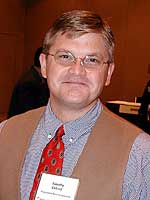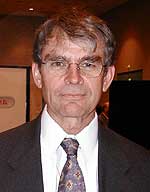By Andrew Haeg
Minnesota Public Radio
October 16, 2002
Venture capitalists and entrepreneurs in Minnesota say the slow economy and declining stock markets make it much harder for new companies to find investors. At a venture capital conference concluding today in Minneapolis, investors say they're more cautious. For entrepreneurs, that's a dramatic change from just two years ago, when a good idea and some gumption could fetch millions of dollars in startup capital.
| |
|
|
|
||
In the boom times of the late 1990s, venture capital was abundant, and so were entrepreneurs with plans for new businesses. Investors looked for, above all, good ideas -- even if the management team behind them was inexperienced and lacked a clear plan for making money.
Now, in this struggling economy, the focus has shifted back to basics -- revenues and management.
At the Collaborative's Venture Finance conference this year, Progressive Rail was typical of the companies making a pitch to prospective investors. The small railroad company in Lakeville, Minnesota is looking for up to $5 million in new financing.
Progressive Rail is a decidedly old economy company, but that's why Tim Eklund, vice president of corporate development, thinks it's an attractive proposition.
"We're not going to be a company that's going to grow 200, 300, 500 percent a year. That's simply not the way we can do it. But by the flipside, we're not going to be a company that in two or three years disappears because our business model doesn't somehow work," says Eklund.
An official with the National Venture Capital Association says venture capital investments in Minnesota are likely to be at their lowest level in four years.
Investors say money is available, but caution abounds.
| |
|
|
|
||
"We're looking for companies that have some sort of safety net," says Gary Smaby, a partner at the Quatris Fund, a venture capital group based in Minneapolis. Smaby says he wants to see companies that can run on a shoestring, and have a record of success.
Investors like Smaby are playing it safe, in large part, because they can no longer count on quick and lucrative returns from a public stock offering or a buyout. Mergers and acquisitions and initial public offerings are as scarce as they've been since the mid-'90s. So Smaby says he has to be wary, and patient.
"We're not in any rush to write the check. We want to make sure we're making good, sound investments. Because we're going to be with these companies for three to five years, and we want to take our time," says Smaby.
It's no surprise, then, that startups have had a hard time finding money. Dan Carr, president of the Collaborative, which sponsors the conference, says many venture capitalists are -- for now -- too busy managing their current investments to make new bets on startup companies.
"The established venture capital firms, especially those with large amounts of money under management, have really had to go through a bit of a triage in their portfolios. Because of that they've focused a lot of their energy and their capital on those existing portfolios. So what you're seeing is seed capital has been hard to find," Carr says.
|
"The established venture capital firms ... have really had to go through a bit of a triage in their portfolios. They've focused a lot of their energy and their capital on those existing portfolios. So what you're seeing is seed capital has been hard to find." - Dan Carr, president of the Collaborative
|
But that hasn't deterred the many entrepreneurs in attendance from trying. Eric Johnson is CEO of Avenet, a Web site producer for, among others, government agencies and political candidates. Johnson is looking for between $4 million and $8 million to accelerate the company's growth. But he's not ready to give away a big stake in his company if it's what he calls a fire sale price.
"We are positioned to take on more money, and more rapidly grow the company. On the other hand, if the timing's not right, and the valuations aren't right, we're going to successfully expand the company. It just won't be as fast of growth as you could with some new equity investment," says Johnson.
Not everyone at the conference is hearing "no" from investors. Gary Halleen, founder of API Outsourcing, says he's gotten commitments for $5 million in venture capital. His company helps other firms cut expenses on accounting and administration.
"We started when the economy was very good. It was good then because companies were looking at increasing profitability, because it drove their stock up. And so we had a real good thing," says Halleen. "Now they're doing it out of necessity, because things are tough and they're looking for cost savings, and we provide a lot of that cost savings to them."
API is currently hiring. And, in an indication of Minnesota's economic condition, Halleen says that there are "waves of good, talented people" available.


